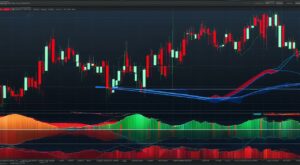Your cart is currently empty!
Is Leverage Allowed in Halal Forex Trading? | Find Out How True

Affiliate Disclaimer: This post may contain affiliate link or links
In the realm of Islamic finance, the concept of Forex trading or foreign exchange trading holds great significance. It embodies intricate details that set it apart from normal Forex trading.
Halal Forex Trading permits leveraging, aligning with Islamic finance principles. Enjoy ethical trading with leverage while adhering to Sharia guidelines. Explore the lucrative and permissible opportunities in the world of halal forex.
Contents
Is Leverage Allowed in Halal Forex Trading?
This article delves into these nuances, illuminating aspects of Halal Forex, Shariah-compliant trading, and Islamic trading accounts.
Dive into the intriguing realm of halal forex trading as we unravel the debate surrounding leverage.
Discover the ethical dimensions and practical considerations that shape this financial landscape. Uncover the truth today!

Definition of Key Terms
- Halal Forex: This refers to Forex trading that is in compliance with Sharia law, devoid of any practices deemed haram or sinful.
- Islamic Stocks: Securities of companies operating under Sharia law.
- Swap-Free Accounts: Account types where overnight or rollover interest charges are eliminated, making them Shariah-compliant.
- Riba-free Trading: Trading conducted without the element of usury or interest.
Understanding Forex Leverage
Forex leverage is a tool that enables traders to boost their market exposure beyond the initial investment.
This means you can manage a larger position with a smaller amount of money. However, it amplifies both potential gains and losses, making it a risky venture.
With the advantage of forex leverage, managing a larger position by investing a smaller amount becomes a viable strategy.
For instance, a leverage rate of 1:100 means with just $1,000, a trader can control a position worth $100,000. It’s like gaining access to a larger currency market without the need to fully invest in it.
Yet, as much as it sounds as a lucrative tool, it is not bereft of its pitfalls.
The amplified financial potential works both ways, meaning, just as your profits can multiply, your losses can too, proportionate to your leveraged position.
For example, a significant market shift could cause notable changes to your position, leading to potential losses that could exceed your original investment.
Essentially, using leverage is akin to walking on a tightrope—the advantages may be high, but so are the risks.
Therefore, it is a facet of forex trading that should be approached with knowledge, planning, and a significant measure of caution.

Forex Leverage and Islamic Finance
Within Islamic finance, leverage is a contentious issue. While some interpret forex leverage as a form of loan, thus classifying it as Riba (interest), others deem it permissible under permissible leverage or margin trading in Islam.
The consensus remains clouded; however, various scholarly opinions lean towards the latter interpretation, allowing its use with caution.
One school of thought interprets forex leverage as a form of loan or credit, thereby attracting elements of Riba or usury, which is strictly prohibited in Islam.
They argue that the act of borrowing money to enhance potential gains implicates the borrower in gauging interest, thus violating the Islamic prohibition of Riba.
Conversely, another perspective views leverage as a permissible trading tool under Sharia law — as long as it is governed by the principles of fair and ethical trading, it is considered lawful or Halal.
This view hinges on the essence of margin trading in Islam, which necessitates a form of collateral or security, not a loan.
So, while there isn’t a unanimous consensus on leveraging in Islamic finance, there is a common ground: If it is to be used, it must be employed with caution and within the laws of Islamic finance.
The absolute avoidance of Riba and ensuring actions do not lead to harmful practices like Gharar (uncertainty) or Maysir (gambling) is paramount.
A robust awareness of these principles and seeking advice from scholars or advisors familiar with both the intricacies of Islamic law and financial markets is essential.

The Concept of Riba and its Implications on Forex Trading
Riba, or interest, is strictly prohibited in Islam. Therefore, any form of trading involving interest, including certain forms of forex trading, is not permissible.
The fatwa on forex trading and fatwa on leverage trading further reinforces this stance, requiring Forex brokers for Muslims to offer riba-free trading methods.
Islamic scholars have released numerous fatwas (Islamic legal rulings) on the issue of forex trading, mostly emphasizing its compliance with the tenets of Islamic law.
According to these fatwas, any form of trading that involves earning or paying interest, sometimes disguised as ‘commission’ or ‘fees’, is not permissible.
This includes leveraging, where the borrowed capital often incurs interest.
Consequently, these fatwas necessitate forex brokers catering to Muslim traders to provide interest-free trading methods, or swap-free accounts as they’re often called.
Traders can utilize this feature to engage in forex trading without contravening Islamic laws on Riba, enabling them to participate in the forex market faithfully within their religious beliefs.
The important caution here is that traders must carefully examine the details of these ‘Halal’ or ‘Islamic’ accounts and consult a trusted scholar if required.
To ensure that they are truly complying with the fundamental principles of Islamic finance.

Day and Swing Trading in Islam
Day trading in Islam involves executing trades within a single day, aiming to profit from short-term price fluctuations.
Contrarily, swing trading in Islam targets gains from price swings occurring over several days or weeks. Both are considered acceptable, provided they don’t involve any non-compliant activities.
Swing trading under Islamic principles operates within the guidelines, avoiding short-selling or the use of margin, which are similar to borrowing and paying interest, hence violating Islamic prohibitions.
This approach is based on analyzing market trends and patterns to predict future price movements.
The goal is to capitalize on price fluctuations to generate profits, but without engaging in speculative or ‘gharar’ transactions. It’s crucial that the underlying asset is halal and transactions are done on a spot basis.
Ultimately, whether it’s swing trading or long-term investing, the emphasis is always on maintaining compliance with Shariah and promoting ethical trading practices.

Ethical Trading and Islamic Finance
Ethical trading accounts mirror the ethical principles that guide Islamic finance, advocating for socially and environmentally responsible trading.
These principles underpin halal equities, Shariah funds, and Islamic ETFs aimed at fostering an ethical, equitable economic system.
Such trading tools prohibit investments in businesses that violate Islamic values, such as those dealing in alcohol, pork, gambling, or weapons.
This ethos extends to prohibiting interests bearing transactions and promoting risk-sharing, ensuring an equal footing between the investor and investee.
Halal equities involve investing in compliant companies, whereas Shariah funds invest in a diversified portfolio of halal stocks.
On the other hand, Islamic ETFs offer exposure to an index tracking Shariah-compliant companies. All these aim at integrating ethical and moral values into financial transactions.
Furthermore, they emphasise transparency, economic empowerment, and risk mitigation, driving a sustainable and morally conscious financial landscape.

Other Trading Platforms and Islam
Trading of various economic instruments, including commodities trading in Islam, futures trading in Islam, options trading in Islam.
And cryptocurrency trading in Islam falls within the ambit of permissible trading, as long as they abide by Islamic rulings.
Moreover, Elements like equity trading in Islam and currency pairs trading in Islam have unique stipulations.
Often requiring an in-depth understanding of technical analysis in Islam and fundamental analysis in Islam to ensure compliance.
| Type of Trading | Halal (Permissible) or Haram (Forbidden) |
|---|---|
| Day Trading | Generally considered Haram due to the speculative nature, risk, and uncertainty ‘Gharar’ that it involves. However, if conducted using Shariah-compliant securities and without the use of margin or short selling, it could be seen as Halal. |
| Margin Trading | Considered Haram as it involves borrowing money to buy securities, which is seen as a form of Riba (interest), prohibited in Islam. |
| Options Trading | Debated. Some scholars consider it Haram due to elements of excessive uncertainty and speculation. Others believe it can be halal if strict rules are followed to eliminate ‘Gharar’. |
| Futures Trading | Usually seen as Haram because of the ‘Gharar’ and Riba involved. These contracts involve buying a security at a future date, which may involve paying interest and uncertainty. |
| Binary Trading | Considered Haram as it is high risk, speculative and akin to gambling, which is forbidden in Islam. |
| Commodity Trading | Generally, it is considered Halal if the traded commodities are Halal and transactions are done following Islamic principles such as instant exchange and possession. However, if it involves interest, delay in exchange, or uncertainty, it could become Haram. |
| Forex Trading | Highly debated. It can be Halal if it is conducted without the involvement of Riba, speculation, or gambling elements, and deals are made on the spot. However, if these elements are present, it is seen as Haram. |
| Fixed Income/Bonds | Considered Haram due to the involvement of Riba (interest). |
| Shares/Equities | Considered Halal if investment is made in companies that comply with Islamic principles. This means the companies should not be involved in any Haram activities. |

Shariah-Compliant Financing Options
An array of Shariah-compliant financial instruments such as Murabaha loans, Mudharabah investments, Musharaka financing, Ijara leasing.
And Wakala investments serve as legitimate means for financing within Islamic restrictions.
These financial tools strictly adhere to the rules of usury or ‘Riba’, and ‘Gharar’, or uncertainty which are prohibited under Islamic law.
The essence of these instruments is profit and loss sharing and asset-backed financing. In Murabaha loans, the bank purchases and sells goods to the customer at a markup.
Mudharabah investments represent a partnership where profits are shared, while in Musharaka arrangements all parties contribute to the capital and share profits and losses.
Ijara leasing is akin to renting where the bank buys an asset and leases it to the customer. Lastly, Wakala investments involve an agent undertaking a transaction on behalf of the client for a fee.

Conclusion
The question of whether leverage is allowed in Halal Forex trading is complicated, determined by a myriad of factors rooted in Islamic Finance’s ethical and fair practices.
The key is to operate within the specified boundaries, thus ensuring the sanctity of one’s financial activities.
With the budding growth of Islamic finance globally, it is more important than ever to comprehend the intricacies woven into the fabric of Halal Forex trading and leverage.
Free Download Fibonacci Trading Indicator
Other related articles
- Trade Report Indicator: Indicator for Forex Traders
- Trend Profiteer Trading System: A Trader’s Must Have
- Quantum Trend Sniper Indicator MT4: Free Download
- German Sniper Indicator: Unveiling its Power
- Mastering MACD Intraday Trend | Indicator Free Download
- Crazy Accurate 5-Days Breakout Strategy: Unlock Success

Joseph Benson, I have been trading forex for more than 15 years now and I am still trading actively, a content writer, an Architect also SEO expert, learn how to trade easily with me.










Leave a Reply